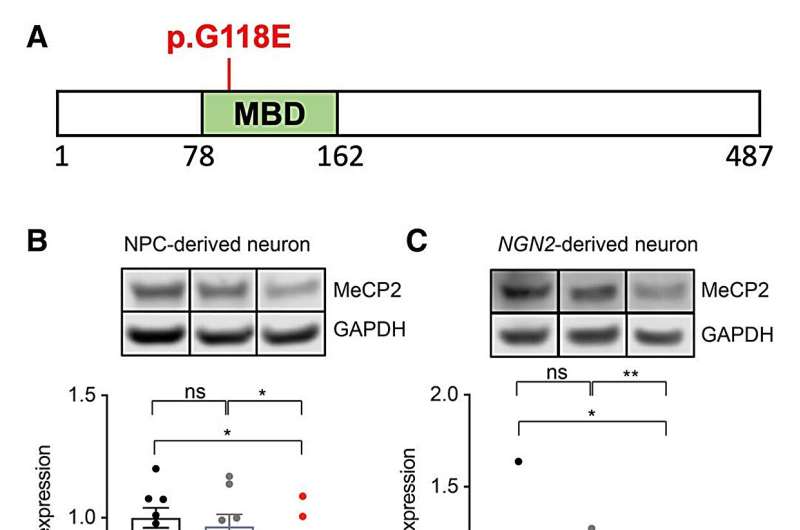This article has been reviewed according to Science X's editorial process and policies. Editors have highlighted the following attributes while ensuring the content's credibility:
fact-checked
peer-reviewed publication
trusted source
proofread
Novel Rett syndrome variant shines light on new screening strategies for therapies

Rett syndrome is a rare devastating neurological disorder that primarily affects young girls and manifests as an impaired ability to walk and talk, along with characteristic 'hand-wringing' movements, seizures, and cognitive disability. This incurable condition results from mutations in the methyl-CpG binding protein 2 (MECP2) gene that impairs the role of the MeCP2 protein in regulating the activity of many genes in brain cells.
A new MECP2 gene variant (G118E) was recently characterized by a research team led by Dr. Huda Zoghbi, a distinguished service professor at Baylor College of Medicine and the founding director of the Jan and Dan Duncan Neurological Research Institute at Texas Children's Hospital (Duncan NRI), and Dr. Robert Tjian, a professor, the holder of the Li Ka Shing Chancellor's Chair in Biology and Howard Hughes Medical Institute Investigator at the University of California at Berkeley.
The study was published in the journal Genes and Development.
Using sophisticated high-resolution, single-molecule imaging techniques, the team revealed with great molecular precision how the G118E mutation affects the dynamics of MeCP2 protein-DNA interactions. The study lays the foundation for the next frontier of innovative human disease discovery research and shines a light on new screening strategies to develop potential therapies for Rett syndrome.
In 1999, Dr. Zoghbi and her research team first discovered mutations in the MECP2 gene as the cause of Rett syndrome. Since then, they have continued to study this rare neurological disorder and have made several landmark discoveries in Rett and other MECP2-related disorders.
"This study characterized a MECP2 mutation that had never been described before in the medical literature, and we had no clue about its biological effects," said Dr. Zoghbi, who is also a Howard Hughes Medical Institute investigator. "Hence, we designed experiments to understand how this novel mutation affects MeCP2 function and causes Rett."
"Our first step was to establish disease models in the lab carrying this specific mutation," Dr. Jian Zhou, a postdoctoral fellow in the Zoghbi lab who led the study, said.
"We took induced pluripotent stem cells (iPSCs), which have unlimited potential and can be turned into any type of human cell in a cell culture dish. Using certain growth factors, we induced them to become neurons. From these studies, we learned the levels of MeCP2 protein were significantly reduced in neurons obtained from G118E mutant stem cells compared to neurons that originated from cells with a normal copy of the MECP2 gene."
Next, using CRISPR-Cas9 technology, the research team generated a mouse model of the G118E mutation to test its effects on the physiology and behavior of live animals. Consistent with their findings from cultured neurons, they found a 40% reduction in MeCP2 levels in the neurons of G118E mice versus healthy mice. They also saw a genome-wide reduction in the capacity of this protein to bind to DNA. Moreover, G118E mice manifested Rett-like symptoms, which together confirmed the disease-causing potential of this mutation.
Since the MeCP2 protein needs to bind efficiently to DNA to function, they next sought to test how the G118E mutation affects the dynamics of MeCP2-DNA interactions. However, a quantitative measurement of this property in live neurons under physiological conditions is challenging. Hence, they collaborated with Dr. Robert Tjian to harness the new single-molecule live imaging technology that his team developed.
"A research specialist, Dr. Claudia Cattoglio, and others in my lab used this powerful approach to get a closer look at the dynamics of MeCP2-DNA interactions in live neurons with G118 mutation," Dr. Tjian, said. "They found that despite the presence of fewer molecules of MeCP2 and their reduced capacity to bind DNA, the residual MeCP2 molecules in G118E neurons retained partial function—a very promising finding—that supports the premise that increasing the levels of MeCP2 protein has the potential to alleviate Rett symptoms in patients."
"About 75% of the Rett-causing mutations retain partial function of the protein and some ability to bind DNA," Dr. Zoghbi said. "But most studies conducted so far on male mice have focused on MECP2 variants whose DNA binding capacity is entirely abolished. Therefore, using cutting-edge live imaging to examine pathogenic mutations like G118E, which retain a bit of protein function, can guide us towards new screening strategies for therapeutics that will help a broad group of Rett patients."
More information: Jian Zhou et al, A novel pathogenic mutation of MeCP2 impairs chromatin association independent of protein levels, Genes & Development (2023). DOI: 10.1101/gad.350733.123


















